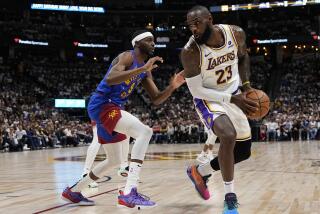Google Video Seeks a Bite of Apple’s Market
Search giant Google Inc. put its own twist on the budding online video market Friday, unveiling an Internet bazaar that allows movie studios, TV networks and any amateur with a camera to sell their wares.
The Google Video Store, launching with 5,000 titles, is the first major challenge to the early lead that Apple Computer Inc. has in the emerging market for online video. It also could help realize the dreams of futurists who have long envisioned the Internet as a creative commons that upends the business models of traditional media.
Big-name content in Google’s service includes new and old CBS-owned shows such as “CSI” and “The Brady Bunch,” National Basketball Assn. games, interviews by PBS’ Charlie Rose and classic cartoons such as “Rocky and Bullwinkle.”
Much as online auctioneer EBay Inc. turned pack rats into retailers, Google’s service also will allow anyone to distribute filmed or animated material they create -- something digital tools make easier than ever.
Independent filmmakers, for instance, can try to bypass Hollywood; dog trainers and yoga instructors can offer how-to videos; and someone who captures a plane crash or other major news event on video can skip the traditional media -- all in favor of selling their work as a digital download.
“Now any guy with a camera who believes in what they’re doing can compete with the Sonys and Warner Bros. of the world,” said director Ben Rekhi, who said he turned down a $125,000 distribution deal to instead sell his film “Waterborne” through Google for $4.99 a download.
But Google Video could just as easily become Google’s first high-profile stumble as the wildly successful company steps into a thicket that has snared other big players -- protecting content from piracy without frustrating buyers.
Google plans to employ its own copy-protection system, establishing a third competitor to industry standards from Apple and Microsoft Corp. That threatens to slow mainstream acceptance of online video because material bought from one vendor may not work with devices sold by another.
For example, videos using Google’s copy protection won’t play on an Apple iPod.
Analysts caution that the technology and entertainment industries have to resolve this issue before online video becomes commonplace. The Google service is “a sign of legitimacy for this video-over-the-Web marketplace,” said Allen Weiner, an analyst with Gartner Inc. But, he said, “you’re going to have to see a lot happen before it hits the mainstream.”
Unlike services such as Apple’s iTunes video store, Google is letting content owners decide how much to charge for their videos, with no minimum or maximum prices. Content owners can also decide whether to use copy protections to prevent customers from transferring the videos they buy onto portable devices.
In the market for online distribution of TV shows, “iTunes broke things open,” said Forrester Research analyst Charlene Li. “The difference here is, it’s completely open and completely flexible.”
If the service catches on, it could become a significant source of revenue for Google, which generates billions of dollars a year by placing ads on search results and other Web pages. Google is still deciding whether to place ads in the online store, but it does take a cut of each video it sells. One partner said Google’s take was 30%, but the firm declined to comment on the terms of its contracts.
Of course, there are no assurances that consumers will want to buy the videos, or even that they’ll be worth paying for. For every “CSI” or “Survivor,” there will probably be thousands of cheaply made, hard-to-sell videos that flood the service.
But claims that the Internet would allow anyone to become a producer are finally starting to become a reality. Such consumer-produced media as weblogs and podcasts have helped everyday people find audiences online. And some amateur videos, such as “Numa Numa Dance” and “Back Dorm Boys,” have become pop phenoms on the Internet.
Such clips, which generally spread on weblogs and by e-mail free of charge, have helped Google attract nearly 3 million visitors a month to the video portion of its search engine. Selling access to such videos, however, may present problems because charging for access would impede their spread, and many include copyrighted music without permission. Google said it wouldn’t sell material that violates copyrights.
Another no-no: porn. Google Video’s terms of service prohibit adding video clips that the company considers “pornography or obscenity,” “invasions of personal privacy” or “promotions of hate or incitement of violence.”
Despite those limitations, several Google Video Store partners said they were attracted to the service by its lack of rules. Jennifer Feikin, director of Google Video, said the company didn’t want to tell content owners how to sell their content because nobody seems to know yet what will work.
“We don’t know any better than they do at this point,” she said. “Why don’t we let the market decide?”
That’s the “quintessential Google approach,” said Brenda Spoonemore, senior vice president for NBA Entertainment. The sport league’s first priority is to get people to watch the games in person or on TV, she said. But the league is intrigued by the potential of letting fans pay to watch big games they may have missed.
The NBA is charging $3.95 to purchase game broadcasts 24 hours after they air, but Spoonemore said she liked the service’s ability to let sellers change pricing on the fly, depending on how shows are moving.
“The Google model is flexible enough to allow us to react to the marketplace,” she said.
The program may be hindered by copy protections. Google’s decision to use its own digital rights management software could even further fracture the market for digital video in its formative years. Consumers may find themselves unable to keep track of how and where they’re able to watch shows.
The Google copy-protection software also imposes a big restriction: The CBS shows, NBA games and other material protected by the software can be watched only on a computer that’s connected to the Internet.
“I think it’s going to be a problem,” said Li, the Forrester analyst, adding that Google executives told her they were trying to fix it.
Filmmaker Rekhi, who is based in Santa Monica, plans to make “Waterborne” available as a free stream on Google for the first week. After that, the 80-minute film about terrorists poisoning the Los Angeles water supply will be available for a $4.99 download. He decided to let customers burn the film to DVD and watch it on their TVs or transfer it to a portable device.
“We want to be ahead of the curve,” he said. “Nobody ever got ahead by playing it safe.”
*
(BEGIN TEXT OF INFOBOX)
How Google Video Store works
* Google users can look up videos by keywords or browse through categories of videos for sale or rent.
* To buy or rent a video, customers must sign up for a Google account and enter a credit card number.
* Playback must be through a Google video player, which can be downloaded free at video.google.com.
Los Angeles Times






